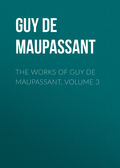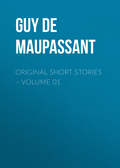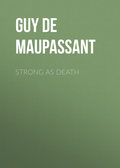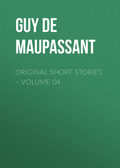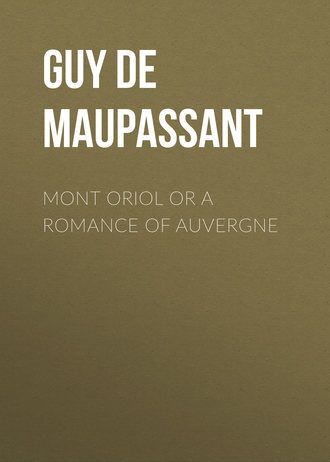
Ги де Мопассан
Mont Oriol or A Romance of Auvergne
By dint of resorting to dodges to get the money necessary for the life which they led, outwitting usurers, borrowing on all sides, putting off tradesmen, laughing in the faces of their tailors when presented with a big bill every six months, listening to girls telling about the infamies they perpetrated in order to gratify their feminine greed, seeing systematic cheating at clubs, knowing and feeling that they were individually robbed by everyone, by servants, merchants, keepers of big restaurants and others, becoming acquainted with certain sharp practices and shady transactions in which they themselves had a hand in order to knock out a few louis, their moral sense had become blunted, used up, and their sole point of honor consisted in fighting duels when they realized that they were suspected of all the things of which they were either capable or actually guilty.
Everyone of these young roués, after some years of this existence, ended with a rich marriage, or a scandal, or a suicide, or a mysterious disappearance as complete as death. But they put their principal reliance on the rich marriage. Some trusted to their families to procure such a thing for them; others looked out themselves for it without letting it be noticed; and they had lists of heiresses just as people have lists of houses for sale. They kept their eyes fixed especially on the exotics, the Americans of the north and of the south, whom they dazzled by their "chic," by their reputation as fast men, by talk about their successes, and by the elegance of their persons. And their tradesmen also placed reliance on the rich marriage.
But this hunt after the girl with a fortune was bound to be protracted. In any case it involved inquiries, the trouble of winning a female heart, fatigues, visits, all that exercise of energy of which Gontran, careless by nature, remained utterly incapable. For a long time past, he had been saying to himself, feeling each day more keenly the unpleasantness of impecuniosity: "I must, for all that, think over it." But he did not think over it, and so he found nothing. He had been reduced to the ingenious pursuit of paltry sums, to all the questionable steps of people at the end of their resources, and, to crown all, to long sojourns in the family, when Andermatt had suddenly suggested to him the idea of marrying one of the Oriol girls.
He had, at first, said nothing through prudence, although the young girl appeared to him, at first blush, too much beneath him for him to consent to such an unequal match. But a few minutes' reflection had very speedily modified his view; and he forthwith made up his mind to make love to her in a bantering sort of way – the love-making of a spa – which would not compromise him, and would permit him to back out of it.
Thoroughly acquainted with his brother-in-law's character, he knew that this proposition must have been cogitated for a long time, and weighed and matured by him – that she meant to him a valuable prize such as it would be hard to find elsewhere.
It would cost him no trouble but that of stooping down and picking up a pretty girl, for he liked the younger sister very much, and he had often said to himself that she would be nice to associate with later on. He had accordingly selected Charlotte Oriol; and in a little time would have brought matters to the point when a regular proposal might have been made to her.
Now, as the father was bestowing on his other daughter the dowry coveted by Andermatt, Gontran had either to renounce this union or turn round to the elder sister. He felt intense dissatisfaction with this state of affairs and he had been thinking in his first moments of vexation of sending his brother-in-law to the devil and remaining a bachelor until a fresh opportunity arose. But just at that very time he found himself quite cleaned out, so that he had to ask, for his play at the Casino, a sum of twenty-five louis from Paul, after many similar loans, which he had never paid back. And again, he would have to look for a rich wife, find her, and captivate her, while without any change of place, with only a few days of attention and gallantry, he could capture the elder of the Oriol girls just as he had been able to make a conquest of the younger. In this way he would make sure in his brother-in-law of a banker whom he might render always responsible, on whom he might cast endless reproaches, and whose cash-box would always be open for him.
As for his wife, he could bring her to Paris, and there introduce her into society as the daughter of Andermatt's partner. Moreover, she bore the name of the spa, to which he would never bring her back! Never! never! in virtue of the natural law that streams do not return to their sources. She had a nice face and figure, sufficiently distinguished already to become entirely so, sufficiently intelligent to understand the ways of society, to hold her own in it, to make a good show in it, and even to do him honor. People would say: "This joker here has married a lovely girl, at whom he looks as if he were not making a bad joke of it." And he would not make a bad joke of it, in fact, for he counted on resuming by her side his bachelor existence with the money in his pockets.
So he turned toward Louise Oriol, and, taking advantage of the jealousy awakened in the skittish heart of the young girl, without being aware of it, had excited in her a coquetry which had hitherto slumbered, and a vague desire to take away from her sister this handsome lover whom people addressed as "Monsieur le Comte."
She had not said this in her own mind. She had neither thought it out nor contrived it, being surprised at their being thrown together and going off in one another's company. But when she saw him assiduous and gallant toward her, she felt from his demeanor, from his glances, and his entire attitude, that he was not enamored of Charlotte, and without trying to see beyond that, she was in a happy, joyous, almost triumphant frame of mind as she lay down to sleep.
They hesitated for a long time on the following Thursday before starting for the Puy de la Nugère. The gloomy sky and the heavy atmosphere made them anticipate rain. But Gontran insisted so strongly on going that he carried the waverers along with him. The breakfast was a melancholy affair. Christiane and Paul had quarreled the night before, without apparent cause. Andermatt was afraid that Gontran's marriage might not take place, for Père Oriol had, that very morning, spoken of him in equivocal terms. Gontran, on being informed of this, got angry and made up his mind that he would succeed. Charlotte, foreseeing her sister's triumph, without at all understanding this transfer of Gontran's affections, strongly desired to remain in the village. With some difficulty they prevailed on her to come.
Accordingly the Noah's Ark carried its full number of ordinary passengers in the direction of the high plateau which looks down on Volvic. Louise Oriol, suddenly becoming loquacious, acted as their guide along the road. She explained how the stone of Volvic, which is nothing else but the lava-current of the surrounding peaks, had helped to build all the churches and all the houses in the district – a circumstance which gives to the towns in Auvergne the dark and charred-looking aspect that they present.
She pointed out the yards where this stone was cut, showed them the molten rock that was worked as a quarry, from which was extracted the rough lava, and made them view with admiration, standing on a hilltop and bending over Volvic, the immense black Virgin who protects the town. Then they ascended toward the upper plateau, embossed with extinct volcanoes. The horses went at a walking pace over the long and toilsome road. Their path was bordered with beautiful green woods, and nobody talked any longer.
Christiane was thinking about Tazenat. It was the same carriage; they were the same persons; but their hearts were no longer the same. Everything seemed as it had been – and yet? and yet? What then had happened? Almost nothing. A little love the more on her part! A little love the less on his! Almost nothing – the invisible rent which weariness makes in an intimate attachment – oh! almost nothing – and the look in the changed eyes, because the same eyes no longer saw the same faces in the same way. What is this but a look? Almost nothing!
The coachman drew up, and said: "It is here, at the right, through that path in the wood. You have only to follow it in order to get there."
All descended, save the Marquis, who thought the weather too warm. Louise and Gontran went on in front, and Charlotte remained behind with Paul and Christiane, who found difficulty in walking. The path appeared to them long, right through the wood; then they reached a crest covered with tall grass which led by a steep ascent to the sides of the old crater. Louise and Gontran, halting when they got to the top, both looking tall and slender, had the appearance of standing in the clouds. When the others had come up with them, Paul Bretigny's enthusiastic soul was inflamed with poetic rapture.
Around them, behind them, to right, to left, they were surrounded by strange cones, decapitated, some shooting forth, others crushed into a mass, but all preserving their fantastic physiognomy of dead volcanoes. These heavy fragments of mountains with flat summits rose from south to west along an immense plateau of desolate appearance, which, itself a thousand meters above the Limagne, looked down upon it, as far as the eye could reach, toward the east and the north, on to the invisible horizon, always veiled, always blue.
The Puy de Dome, at the right, towered above all its fellows, with from seventy to eighty craters now gone to sleep. Further on were the Puy de Gravenoire, the Puy de Crouel, the Puy de la Pedge, the Puy de Sault, the Puy de Noschamps, the Puy de la Vache. Nearer, were the Puy de Come, the Puy de Jumes, the Puy de Tressoux, the Puy de Louchadière – a vast cemetery of volcanoes.
The young men gazed at the scene in amazement. At their feet opened the first crater of La Nugère, a deep grassy basin at the bottom of which could be seen three enormous blocks of brown lava, lifted up with the monster's last puff and then sunk once more into his throat as he expired, remaining there from century to century forever.
Gontran exclaimed: "As for me, I am going down to the bottom. I want to see how they give up the ghost – creatures of this sort. Come along, Mesdemoiselles, for a little run down the slope." And seizing Louise's arm, he dragged her after him. Charlotte followed them, running after them. Then, all of a sudden, she stopped, watched them as they flew along, jumping with their arms linked, and, turning back abruptly, she reascended toward Christiane and Paul, who were seated on the grass at the top of the declivity. When she reached them, she fell upon her knees, and, hiding her face in the young girl's robe she wore, she burst out sobbing.
Christiane, who understood what was the matter, and whom all the sorrows of others had, for some time past, pierced like wounds inflicted upon herself, flung her arms around the girl's neck, and, moved also by her tears, murmured: "Poor little thing! poor little thing!" The girl kept crying incessantly, and with her hands dropping listlessly to the ground, she tore up the grass unconscious of what she was doing.
Bretigny had risen up in order to avoid the appearance of having observed her, but this misery endured by a young girl, this distress of an innocent creature, filled him suddenly with indignation against Gontran. He, whom Christiane's deep anguish only exasperated, was touched to the bottom of his heart by a girl's first disillusion.
He came back, and kneeling down in his turn, in order to speak to her, said: "Come, calm yourself, I beg of you. They are going to return presently. They must not see you crying."
She sprang to her feet, scared by this idea that her sister might find her with tears in her eyes. Her throat remained choking with sobs, which she held back, which she swallowed down, which she sent back into her heart, filling it with more poignant grief. She faltered: "Yes – yes – it is over – it is nothing – it is over. Look here! It cannot be noticed now. Isn't that so? It cannot be noticed now."
Christiane wiped her cheeks with her handkerchief, then passed it also across her own. She said to Paul:
"Go, pray, and see what they are doing. We cannot see them any longer. They have disappeared under the blocks of lava. I will look after this little one, and console her."
Bretigny had again stood up, and in a trembling voice, said: "I am going there – and I'll bring them back, but it will be my affair – your brother – this very day – and he shall give me an explanation of his unjustifiable conduct, after what he said to us the other day." He began to descend, running toward the center of the crater.
Gontran, hurrying Louise along, had pulled her with all his strength over the steep side of the chasm, in order to hold her up, to sustain her, to put her out of breath, to make her dizzy, and to frighten her. She, carried along by his wild rush, attempted to stop him, gasping: "Oh! not so quickly – I'm going to fall – why, you're mad – I'm going to fall!"
They knocked against the blocks of lava, and remained standing up, both breathless. Then they walked round the crater staring at the big gaps which formed below a kind of cavern, with a double outlet.
When at the end of its life, the volcano had cast out this last mouthful of foam, unable to shoot it up to the sky as in former times, he had spat it forth, so that, thick and half-cooled, it fixed itself upon his dying lips.
"We must enter under there," said Gontran. And he pushed the young girl before him. Then, when they were in the grotto, he said: "Well, Mademoiselle, this is the moment to make a declaration to you."
She was stupefied: "A declaration – to me!"
"Why, yes, in four words – I find you charming!"
"It is to my sister you should say that!"
"Oh! you know well that I am not making a declaration to your sister."
"Come, now!"
"Look here! you would not be a woman if you did not understand that I have paid attentions to her to see what you would think of it! – and what looks you gave me on account of it. Why, you looked daggers at me! Oh! I'm quite satisfied. So then I have tried to prove to you, by all the consideration in my power, how much I thought about you."
Nobody had ever before talked to her in this way. She felt confused and delighted, her heart full of joy and pride. He went on: "I know well that I have been nasty toward your little sister. So much the worse. She is not deceived by it, never fear. You see how she remained on the hillside, how she was not inclined to follow us. Oh! she understands! she understands!"
He had caught hold of one of Louise Oriol's hands, and he kissed the ends of her fingers softly, gallantly, murmuring: "How nice you are! How nice you are!"
She, leaning against the wall of lava, heard his heart beating with emotion without uttering a word. The thought, the sole thought, which floated in her agitated mind, was one of triumph; she had got the better of her sister! But a shadow appeared at the entrance to the grotto. Paul Bretigny was looking at them. Gontran, in a natural fashion, let fall the little hand which he had been raising to his lips, and said: "Hallo! you here? Are you alone?"
"Yes. We were surprised to see you disappearing down here."
"Oh! well, let us go back. We were looking at this. Isn't it rather curious?"
Louise, flushed up to her temples, went out first, and began to reascend the slope, followed by the two young men, who were talking behind in a low tone.
Christiane and Charlotte saw them approaching, and awaited them with clasped hands.
They went back to the carriage in which the Marquis had remained, and the Noah's Ark set out again for Enval.
Suddenly, in the midst of a little forest of pine-trees the landau stopped, and the coachman began to swear. An old dead ass blocked the way.
Everyone wanted to look at it, and they got down off the carriage. He lay stretched on the blackened dust, himself discolored, and so lean that his worn skin at the places where the bones projected seemed as if it would have been burst through if the animal had not breathed forth his last sigh. The entire carcass outlined itself under the gnawed hair of his sides, and his head looked enormous – a poor-looking head, with the eyes closed, tranquil now on its bed of broken stones, so tranquil, so calm in death, that it appeared happy and surprised at this new-found rest. His big ears, now relaxed, lay like rags. Two raw wounds on his knees told how often he had fallen that very day before sinking down for the last time; and another wound on the side showed the place where his master, for years and years, had been pricking him with an iron spike attached to the end of a stick, to hasten his slow pace.
The coachman, having caught its hind legs, dragged it toward a ditch, and the neck was strained as if the dead brute were going to bray once more, to give vent to a last complaint. When this was done, the man, in a rage, muttered: "What brutes, to leave this in the middle of the road!"
No other person had said a word; they again stepped into the carriage. Christiane, heartbroken, crushed, saw all the miserable life of this animal ended thus at the side of the road: the merry little donkey with his big head, in which glittered a pair of big eyes, comical and good-tempered, with his rough hair and his long ears, gamboling about, still free, close to his mother's legs; then the first cart; the first uphill journey; the first blows; and, after that, the ceaseless and terrible walking along interminable roads, the overpowering heat of the sun, and nothing for food save a little straw, a little hay, or some branches, while all along the hard roads there was the temptation of the green meadows.
And then, again, as age came upon him, the iron spike replacing the pliant switch; and the frightful martyrdom of the animal, worn out, bereft of breath, bruised, always dragging after it excessive loads, and suffering in all its limbs, in all its old body, shabby as a beggar's cart. And then the death, the beneficent death, three paces away from the grass of the ditch, to which a man, passing by, drags it with oaths, in order to clear the road.
Christiane, for the first time, understood the wretchedness of enslaved creatures; and death appeared to her also a very good thing at times.
Suddenly they passed by a little cart, which a man nearly naked, a woman in tatters, and a lean dog were dragging along, exhausted by fatigue. The occupants of the carriage noticed that they were sweating and panting. The dog, with his tongue out, fleshless and mangy, was fastened between the wheels. There were in this cart pieces of wood picked up everywhere, stolen, no doubt, roots, stumps, broken branches, which seemed to hide other things; then over these branches rags, and on these rags a child, nothing but a head starting out through gray old scraps of cloth, a round ball with two eyes, a nose, and a mouth!
This was a family, a human family! The ass had succumbed to fatigue, and the man, without pity for his dead servant, without pushing it even into the rut, had left it in the open road, in front of any vehicles which might be coming up. Then, yoking himself in his turn with his wife in the empty shafts, they proceeded to drag it along as the beast had dragged it a short time before. They were going on. Where? To do what? Had they even a few sous? That cart – would they be dragging it forever, not being in a position to buy another animal? What would they live on? Where would they stop? They would probably die as their donkey had died.
Were they married, these beggars, or merely living together? And their child would do the same as they did, this little brute as yet unformed, concealed under sordid wrappings. Christiane was thinking on all these things; and new sensations rose up in the depths of her pitying soul. She had a glimpse of the misery of the poor.
Gontran said, all of a sudden: "I don't know why, but I would think it a delicious thing if we were all to dine together this evening at the Café Anglais. It would give me pleasure to have a look at the boulevard."
And the Marquis muttered: "Bah! we are well enough here. The new hotel is much better than the old one."
They passed in front of Tournoel. A recollection of the spot made Christiane's heart palpitate, as she recognized a certain chestnut-tree. She glanced toward Paul, who had closed his eyes, so that he did not see her meek, appealing face.
Soon they perceived two men before the carriage, two vinedressers returning from work carrying their rakes on their shoulders, and walking with the long, weary steps of laborers. The Oriol girls reddened to their very temples. It was their father and their brother, who had gone back to their vine-lands as in former times, and passed their days sweating over the soil which they had enriched, and bent double, with their buttocks in the air, kept toiling at it from morning until evening, while the fine frock-coats, carefully folded up, were at rest in the chest of drawers, and the tall hats in a press.
The two peasants bowed with a friendly smile, while everyone in the landau waved a hand in response to their "Good evening."
When they got back, just as Gontran was stepping out of the Ark to go up to the Casino, Bretigny accompanied him, and stopping on the first steps, said:
"Listen, my friend! What you're doing is not right, and I've promised your sister to speak to you about it."
"To speak about what?"
"About the way you have been acting during the last few days."
Gontran had resumed his impertinent air.
"Acting? Toward whom?"
"Toward this girl whom you are meanly jilting."
"Do you think so?"
"Yes, I do think so – and I am right in thinking so."
"Bah! you are becoming very scrupulous on the subject of jilting."
"Ah, my friend, 'tis not a question of a loose woman here, but of a young girl."
"I know that perfectly; therefore, I have not seduced her. The difference is very marked."
They went on walking together side by side. Gontran's demeanor exasperated Paul, who replied:
"If I were not your friend, I would say some very severe things to you."
"And for my part I would not permit you to say them."
"Look here, listen to me, my friend! This young girl excites my pity. She was weeping a little while ago."
"Bah! she was weeping! Why, that's a compliment to me!"
"Come, don't trifle! What do you mean to do?"
"I? Nothing!"
"Just consider! You have gone so far with her that you have compromised her. The other day you told your sister and me that you were thinking of marrying her."
Gontran stopped in his walk, and in that mocking tone through which a menace showed itself:
"My sister and you would do better not to bother yourselves about other people's love affairs. I told you that this girl pleases me well enough, and that if I happened to marry her, I would be doing a wise and reasonable act. That's all. Now it turns out that to-day I like the elder girl better. I have changed my mind. That's a thing that happens to everyone."
Then, looking him full in the face: "What is it that you do yourself when you cease to care about a woman? Do you look after her?"
Paul Bretigny, astonished, sought to penetrate the profound meaning, the hidden sense, of these words. A little feverishness also mounted into his brain. He said in a violent tone:
"I tell you again this is not a question of a hussy or a married woman, but of a young girl whom you have deceived, if not by promises, at least by your advances. That is not, mark you, the part of a man of honor! – or of an honest man!"
Gontran, pale, his voice quivering, interrupted him: "Hold your tongue! You have already said too much – and I have listened to too much of this. In my turn, if I were not your friend I – I might show you that I have a short temper. Another word, and there is an end of everything between us forever!"
Then, slowly weighing his words, and flinging them in Paul's face, he said: "I have no explanations to offer you – I might rather have to demand them from you. There is a certain kind of indelicacy of which it is not the part of a man of honor or of an honest man to be guilty – which might take many forms – from which friendship ought to keep certain people – and which love does not excuse."
All of a sudden, changing his tone, and almost jesting, he added:
"As for this little Charlotte, if she excites your pity, and if you like her, take her, and marry her. Marriage is often a solution of difficult cases. It is a solution, and a stronghold, in which one may barricade himself against desperate obstacles. She is pretty and rich! It would be very desirable for you to finish with an accident like this! – it would be amusing for us to marry here, the same day, for I certainly will marry the elder one. I tell it to you as a secret, and don't repeat it as yet. Now don't forget that you have less right than anyone else yourself ever to talk about integrity in matters of sentiment, and scruples of affection. And now go and look after your own affairs. I am going to look after mine. Good night!"
And suddenly turning off in another direction, he went down toward the village. Paul Bretigny, with doubts in his mind and uneasiness in his heart, returned with lingering steps to the hotel of Mont Oriol.
He tried to understand thoroughly, to recall each word, in order to determine its meaning, and he was amazed at the secret byways, shameful and unfit to be spoken of, which may be hidden in certain souls.
When Christiane asked him: "What reply did you get from Gontran?"
He faltered: "My God! he – he prefers the elder, just now. I believe he even intends to marry her – and in answer to my rather sharp reproaches he shut my mouth by allusions that are – disquieting to both of us."
Christiane sank into a chair, murmuring: "Oh! my God! my God!"
But, as Gontran had just come in, for the bell had rung for dinner, he kissed her gaily on the forehead, asking: "Well, little sister, how do you feel now? You are not too tired?"
Then he pressed Paul's hand, and, turning toward Andermatt, who had come in after him:
"I say, pearl of brothers-in-law, of husbands, and of friends, can you tell me exactly what an old ass dead on a road is worth?"



